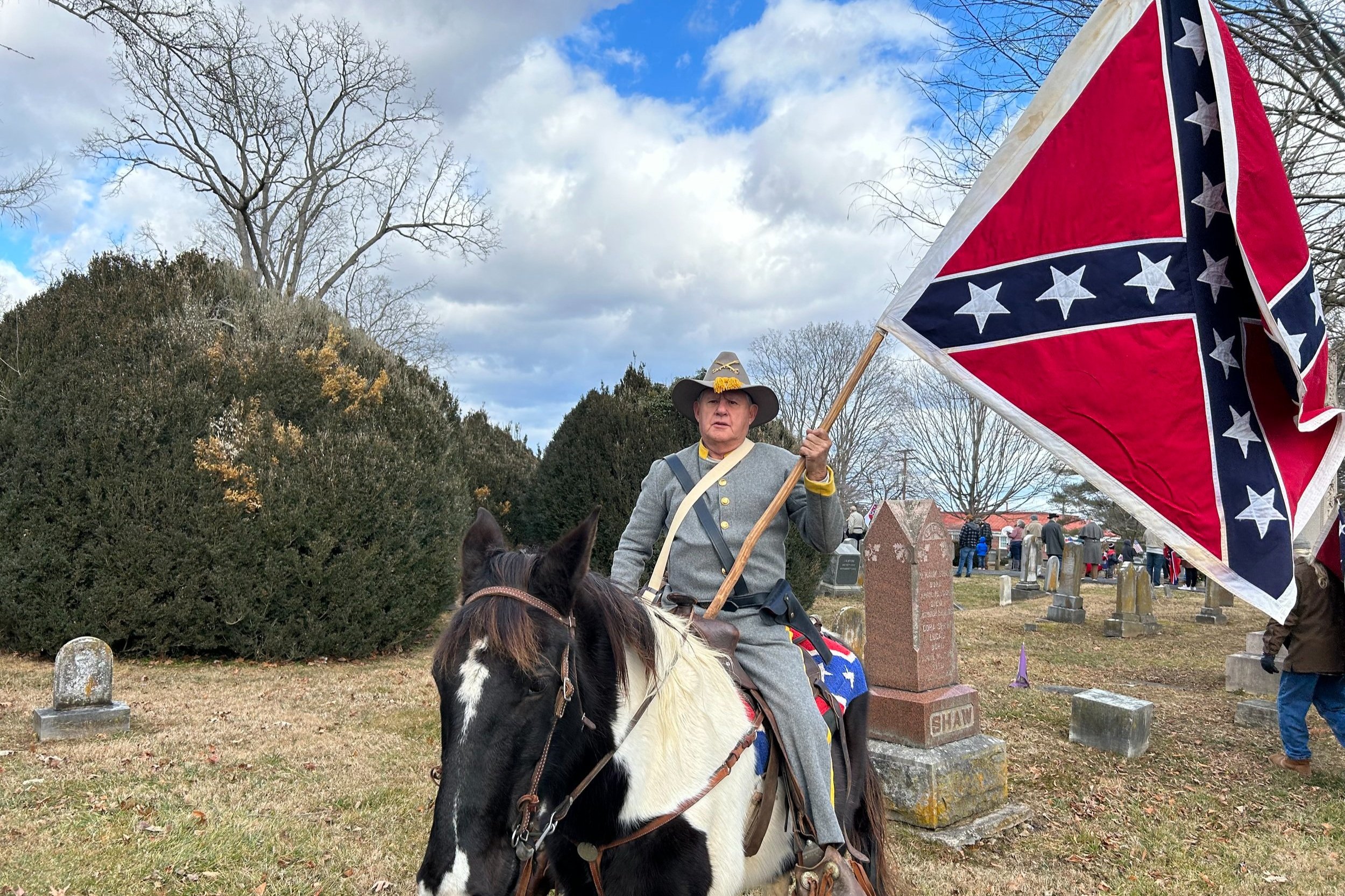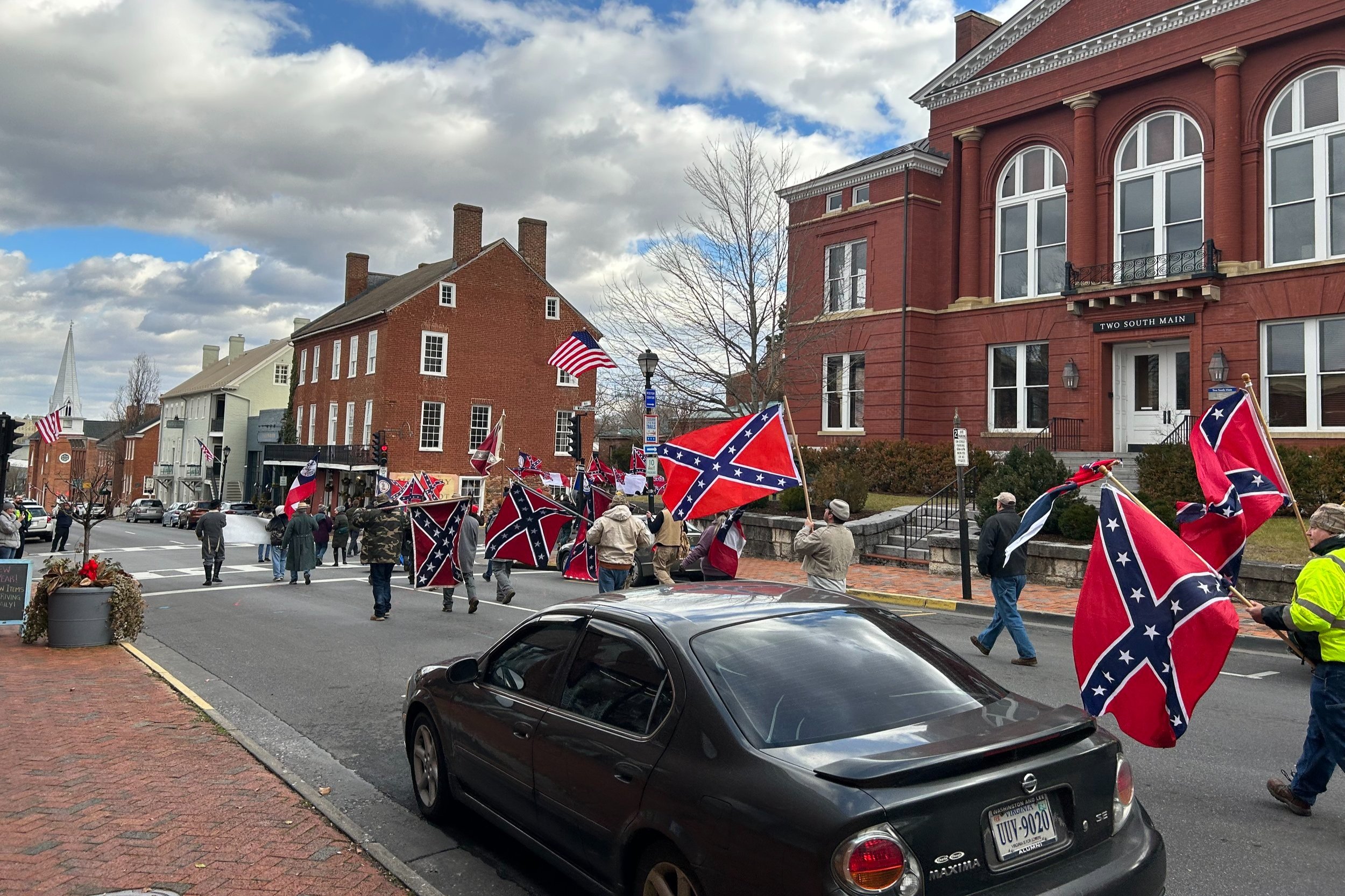Letters: Lee-Jackson Day
Letters: Lee-Jackson Day
Selected correspondence
Letters about any Spectator article are welcome via email to editor@wluspectator.com.




Reading Mr. Spivey’s article (“Ignorance is Bliss at Lee-Jackson Day” op-ed, Jan. 22) and the reaction it has received on Facebook has indicated two things: 1) most readers support Mr. Spivey’s argument that the Confederate flag has different meanings to different people, and 2) there is a scary amount of people who genuinely think slavery was a benevolent institution.
After reading the article I was inclined to give the benefit of doubt to the parade’s attendees. To them the flag and the uniforms are about heritage, as the author says, and even if they are misinformed about the war, it might just be because they have a clouded perception.
But after reading the comments and seeing commenters insist that Southern slaves had it good and that Lincoln was worse than Hitler (yes, one commenter made that point), I have come to understand that Mr. Spivey was wrong: these neo-Confederates are racist and they know what their flag represents.
I don’t even think ignorance could excuse their views at this point, and it makes me thankful that they are not allowed on our campus.
I’ll also admit that although it is only a select group of commenters who are saying the most extreme things, their profiles — stamped with Dixie imagery — reflect poorly on their associates. If you attended the Lee-Jackson parade this year and don’t think you’re racist, do everyone a favor and stay home next time.
Anonymous W&L student (1)
Lexington, VA
Jefferson and Washington, Lee and Jackson; these are men who cannot be venerated — privately or publicly — by any member of today’s society lest they wish to be ostracized.
Despite the prevailing “cancel culture,” the optimistic young conservative should be able to turn his or her head inwards towards the political right. The right should be a place where disagreement is tolerated, and respectful discourse may be heard between differing parties.
Clearly, though, the right is no such place. On the macro-level, Trumpian “MAGA” republicans, more centrist “RINOs,” and various other smaller parties are failing to get along.
On a micro-level, Lee-Jackson day has demonstrated that certain historical opinions are simply untenable. Not only will the left cancel you, but so will the right.
I will be the first to admit, I don’t agree at all with the positions espoused by Dr. Leigh. I think that he, along with the other Friday and Saturday speakers who spoke at the Hilton, downplayed certain historical facts about the South’s faults. Likewise, these men and women clung to historical facts about the South’s glories and successes. From this data, they drew conclusions that I — and most conservatives — would disagree with.
What saddens me is that such a historical opinion was not respected by the recent opinion piece on Lee-Jackson day, published in The Spectator.
The Spectator prides itself in its ability to foster dialogue between the right and the left. There are many at W&L today who downplay everything good that Lee accomplished while overemphasizing his faults to come to conclusions that I, Mr. Spivey, and most readers would find to be grossly inaccurate. However, we all pride ourselves in our ability to have a reasonable debate.
Why is the same courtesy not awarded to modern Confederate sympathizers?
Consider what is permitted in modern public discourse: The mutilation of children, the propagation of sexual lifestyles so abhorrent that they could hardly even be spoken of in private one generation ago, de-facto open borders, blatantly socialist policy such as blanket loan forgiveness, or even the so-called ‘green new deal, etc.
We conservatives, although we may be quite harsh in making jest at these policies and those who propose them, pride ourselves in being able to engage these issues with a respectful tone, and an open mind. We pride ourselves for holding onto the remnants of a truly intellectually free society.
If we really value intellectual freedom, and desire to see a society in which all points of view are respected, we cannot turn our backs on neo-Confederates and tell them that such a courtesy does not apply to them.
If all the aforementioned policies of the left are accepted by society, and engaged respectfully by the right, why is it that the moment a rural southerner stands on the shoulders of his ancestors to defend an idea which is precious to his very soul, he is given the cold shoulder?
Yes, we disagree, but we should also respect.
Anonymous W&L student (2)
Lexington, VA
The Spectator has once again reminded students that they are worshippers of the racist traitor, Robert E. Lee. The author clarifies immediately that the disgraced colonel is his hero (for reasons he does not fully explain), and then goes on to cherry pick the aspects of the Confederacy which he does not want to be associated with.
But does it really matter? Lee fought in a war to oppress Black people and there are accounts of how he beat the people he enslaved. If he won the war, our campus would look much different today. But even after he has died he continues to be a problem.
Instead of wasting time whitewashing his past, The Spectator should focus on actual issues that students care about. But I would not expect much from the group that brought Matt Walsh, an advocate of physical violence against transgender people, to our campus. I only wonder who they will defend next.
Anonymous W&L student (3)
Lexington, VA
It is true that the institution of slavery was declining in the mid-19th century due to a variety of factors, and that Virginia’s state government resisted secession until Lincoln called up the militia after the attack on Fort Sumter. The problem isn’t that these two claims aren’t true; it’s that they are individual details that — torn from the fabric of history — Phil Leigh apparently used to advance the demonstrably false claim that slavery was not a primary cause of the American Civil War.
If anything, slavery’s decline drove Southerners to advocate on its behalf more belligerently than they may have otherwise. In response to increasing antislavery sentiment in the North and the institution’s inability to compete economically with industrialized northern cities, Southern politicians demanded that slavery be federalized through protections for the institution in the territories, fugitive slave laws, and even a constitutional amendment guaranteeing its permanency.
The election of Abraham Lincoln, an unapologetic opponent of slavery who was certain
to firmly resist these demands, resulted in the secession of seven “Deep South” states.
According to Mississippi’s Declaration of Causes for Secession, “Our position is thoroughly identified with the institution of slavery-- the greatest material interest of the world. Its labor supplies the product which constitutes by far the largest and most important portions of commerce of the earth.”
In a corresponding declaration, Texas, among other perceived wrongs, blamed secession on “an unnatural feeling of hostility to these Southern States and their beneficent and patriarchal system of African slavery, proclaiming the debasing doctrine of equality of all men, irrespective of race or color…”
Such perverse ideas were so manifestly incompatible with the principles on which the United States was founded that a crisis was inevitable. As Lincoln had presciently said in his “House Divided” Speech in 1858, “Either the opponents of slavery will arrest the further spread of it, and place it where the public mind shall rest in the belief that it is in the course of ultimate extinction; or its advocates will push it forward, till it become alike lawful in all the States, old as well as knew—North as well as South.
At the end of the day the precise circumstances under which Virginia elected to secede, and even the legality of secession itself, are secondary details; situational red herrings employed by Lost Cause ideology in a misguided attempt to rewrite history.
Iain MacLeod, ‘22
Arlington, VA
This article goes beyond a mere critic of one-third of the Lee-Jackson Day Symposium and in fact will only serve as fodder for the enemies of Lee on the W&L campus and perhaps beyond.
In my opinion, Mr. Spivey just erected another wall of disinformation. He claims to be a great admirer of Robert E. Lee, but if he thinks for one minute that anyone can extricate Lee's reputation beyond a small circle from the Confederacy then Mr. Spivey is blinded by hopeless optimism.
Every bad actor who reads this article will use it to their advantage against the Cause for which Lee fought and therefore it will be another sword against the greatest Captain of that "Lost Cause."
Simply put Washington is inseparable from the Revolution and Hitler from the Holocaust. This article places Lee in the later camp by association. The only conclusion anyone will reach beyond the very academically minded is that Lee was foolish at best and a villain at worst.
Unfortunately for most people the attacks on Lee are political and not academic. In the realm of the body politic where every fool gets a vote, it boils down to the lowest common denominator of information which is that Lee is equal to slavery and since slavery is evil then Lee is evil. If Lee is evil, then his legacy should be destroyed. This simplistic reliance on slavery and tossing every other political consideration aside is detrimental and academically dishonesty.
If Mr. Spivey had been more intellectually honest, he would have attempted to refute the financial and racist motivations of Lincoln and his mid-western supporters exposed by Author Phil Leigh. That very section of the country gave rise to the greatest growth of the Neo-revivalist Klan of the early 20th century as it drove the racist agenda for over half a century.
I once did a paper in high school on the Klan and was shocked at all of the pro-Lincoln KKK propaganda that existed which seemed to be an oxymoron. I was a foolish government school student at the time and as such I was always taught a very slanted view on such things. I began to read other works beyond the tired narrative which has been propped up by decades of academic bias and laziness.
I will have to admire one of my college history professors who told me in all conflicts to "follow the money." Phil Leigh emphasized this point in his talk, a point which Mr. Spivey ignored, by asking the question "who benefits?" No doubt large slave owners sought to protect their wealth from the expansive Republican tariff, who would not.
Oppressive taxes are never popular, and for a much lower tax rate, American Colonists threw a Tea Party while facing down a world dominating superpower. Slavery existed for good or ill but it was only the economic engine, not the Cause and every side wanted that wealth for themselves.
When people's wealth is threatened they go to war whether they are simple farmers or powerful elites. It is the very nature of greed and envy that leads to war and Lincoln's allies both wanted a lily white West and wanted to extract the wealth of slavery indirectly through the tariff.
The proof is that Lincoln was very hesitant to make any move to end slavery and in fact endorsed its continuation throughout most of his first term. Nobody wants to discuss the uncomfortable facts that Lincoln was president when the last slave state was admitted to the Union in West Virginia or that his own home state approved in 1863 an amendment Lincoln himself endorsed to make slavery unrepealable in all areas where it had existed.
As Bill Clinton said about his defeat of President Bush the elder, "it's the economy stupid!" I am wondering if Mr. Spivey has even read the works concerning the efforts of the Lee family in regards to ending slavery itself. I will assume the W&L libraries have been disinfected of such works, however I still have my copies rescued from another library long ago.
This article will continue the unjust foisting on Lee that he was the great defender of slavery because it echoes the claim that slavery is all the war was about.
The fact that Mr. Spivey left after hearing only one speaker is also telling and that he besmirched an entire panel based upon that one speaker is disheartening. Artificial Intelligence (AI) could have written this rebuttal from old articles parroted in any liberal newspaper.
He treats the whole event as if nothing else was worthy to be heard. Chris Mackowski is no "Lost Cause" defender and as an actual adjunct professor and well known historian, you would think he might have a little credibility to criticize. Furthermore, perhaps the most eloquent and certainly another very knowledgeable speaker of the day would have been the last in Bill Potter.
Finally, this event is not billed as some debate where we are going to explore every avenue and consequence of the entire war. There is not enough time in a single day for that. We select speakers that either examine the war from a purely historical perspective or are openly going to explain it from the Southern perspective. This is our opportunity to tell the world how we think.
It seems we have the whole world, including Mr. Spivey apparently, promoting the other viewpoints of history. It would be disingenuous for us to do anything otherwise, just as it would be disingenuous for a conservative newspaper to promote leftist ideology.
I am sure Phil Leigh will be personally disappointed by this coverage as well, I know others have sent him a copy of this article already. It may be that we host him again in the near future to answer the assertions made in this misguided article.
Although we are personally disheartened by what was written by Mr. Spivey, I feel that Lee's legacy will be what suffers the most. Throwing some of the few allies you have in the fight to preserve Lee's legacy at W&L under the proverbial bus cannot bode well for anyone or anything, although I assume 75% of the faculty who hate all things Lee will be delighted.
Brandon Dorsey
Lexington, VA
Mr. Dorsey is Commander of the Stonewall Brigade, SCV #1296
[The opinions expressed in this magazine are the author's own and do not reflect the official policy or position of The Spectator, or any students or other contributors associated with the magazine. It is the intention of The Spectator to promote student thought and civil discourse, and it is our hope to maintain that civility in all discussions.]

